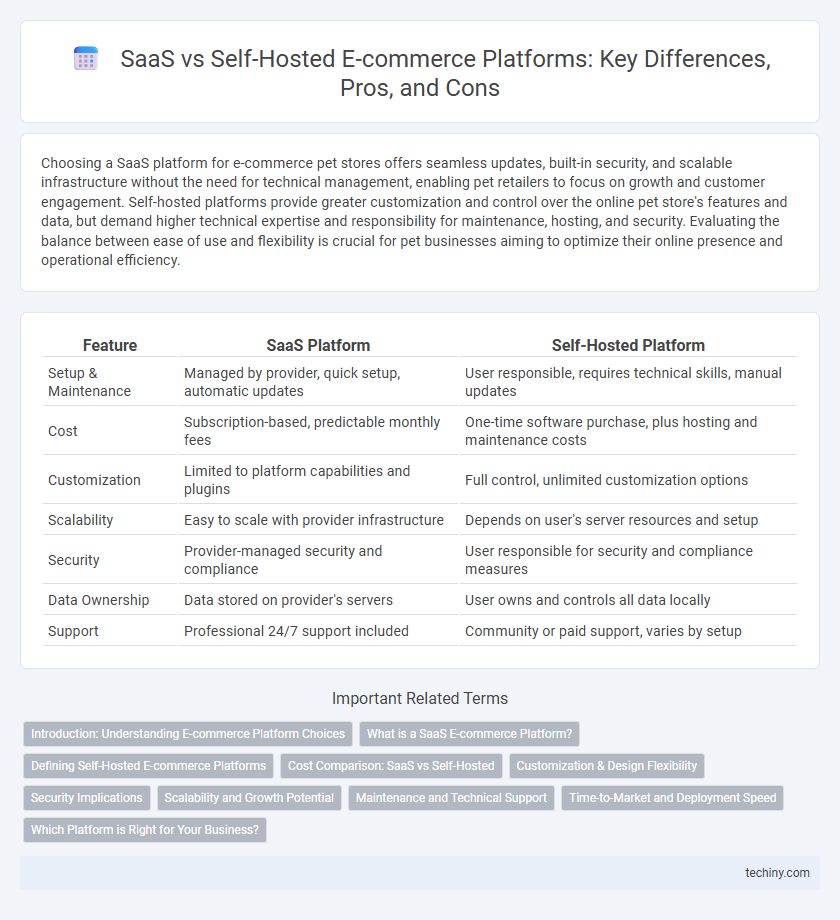Choosing a SaaS platform for e-commerce pet stores offers seamless updates, built-in security, and scalable infrastructure without the need for technical management, enabling pet retailers to focus on growth and customer engagement. Self-hosted platforms provide greater customization and control over the online pet store's features and data, but demand higher technical expertise and responsibility for maintenance, hosting, and security. Evaluating the balance between ease of use and flexibility is crucial for pet businesses aiming to optimize their online presence and operational efficiency.
Table of Comparison
| Feature | SaaS Platform | Self-Hosted Platform |
|---|---|---|
| Setup & Maintenance | Managed by provider, quick setup, automatic updates | User responsible, requires technical skills, manual updates |
| Cost | Subscription-based, predictable monthly fees | One-time software purchase, plus hosting and maintenance costs |
| Customization | Limited to platform capabilities and plugins | Full control, unlimited customization options |
| Scalability | Easy to scale with provider infrastructure | Depends on user's server resources and setup |
| Security | Provider-managed security and compliance | User responsible for security and compliance measures |
| Data Ownership | Data stored on provider's servers | User owns and controls all data locally |
| Support | Professional 24/7 support included | Community or paid support, varies by setup |
Introduction: Understanding E-commerce Platform Choices
E-commerce businesses must choose between SaaS platforms, which offer cloud-based solutions with automatic updates, scalability, and reduced IT maintenance, and self-hosted platforms that provide full control, customization, and data ownership but require in-house technical expertise. SaaS platforms, like Shopify and BigCommerce, enable faster setup and lower upfront costs, while self-hosted options such as Magento or WooCommerce demand hosting management and ongoing maintenance. Understanding these differences is crucial for aligning platform choice with business goals, budget, and technical resources.
What is a SaaS E-commerce Platform?
A SaaS e-commerce platform is a cloud-based software solution that enables businesses to build, manage, and scale online stores without the need for server maintenance or complex installations. It offers built-in hosting, security, and automatic updates, allowing merchants to focus on sales and marketing. Popular SaaS platforms like Shopify and BigCommerce provide customizable templates, integrated payment gateways, and scalable features tailored to various business sizes.
Defining Self-Hosted E-commerce Platforms
Self-hosted e-commerce platforms require businesses to download, install, and manage software on their own servers, offering full control over customization, security, and data management. These platforms typically demand technical expertise for setup, maintenance, and scalability, making them suitable for companies with dedicated IT resources. Unlike SaaS solutions, self-hosted platforms provide flexibility in integrating third-party tools and custom features without ongoing subscription fees.
Cost Comparison: SaaS vs Self-Hosted
SaaS platforms typically offer lower upfront costs with subscription-based pricing models, eliminating the need for significant hardware investments and IT maintenance expenses. Self-hosted platforms require substantial initial capital for server infrastructure, software licenses, and dedicated staff for ongoing management and security updates. Over time, SaaS solutions provide predictable monthly fees and scalable resources, while self-hosted setups may incur fluctuating operational costs impacting total cost of ownership.
Customization & Design Flexibility
SaaS e-commerce platforms offer streamlined customization through pre-built templates and drag-and-drop editors, ideal for businesses seeking rapid deployment with limited technical resources. Self-hosted platforms provide unparalleled design flexibility, allowing developers to fully modify HTML, CSS, and backend code to create unique, brand-specific shopping experiences. Choosing between SaaS and self-hosted solutions hinges on balancing ease of use with the need for tailored, scalable customization options.
Security Implications
SaaS e-commerce platforms provide robust, managed security protocols including regular updates, data encryption, and compliance with industry standards such as PCI-DSS, reducing the burden of in-house security management. Self-hosted platforms offer greater control over security configurations but require dedicated IT resources to implement firewalls, intrusion detection, and timely patches to prevent vulnerabilities. The choice impacts data sovereignty, risk of breaches, and the ability to respond swiftly to emerging cyber threats in a dynamic digital commerce environment.
Scalability and Growth Potential
SaaS platforms offer seamless scalability with automatic updates and infrastructure management, enabling e-commerce businesses to quickly adapt to growing customer demand without significant upfront investment. Self-hosted platforms provide granular control and customization, but scaling often requires additional hardware, technical expertise, and higher maintenance costs. For rapid growth and flexible resource allocation, SaaS platforms typically present a more efficient solution, especially for businesses anticipating fluctuating traffic and evolving market needs.
Maintenance and Technical Support
SaaS platforms offer automated maintenance and continuous technical support managed by providers, reducing the need for in-house IT resources. Self-hosted platforms require dedicated teams to handle software updates, security patches, and infrastructure challenges, increasing operational complexity. Reliable uptime and quick issue resolution are critical factors favoring SaaS solutions in dynamic e-commerce environments.
Time-to-Market and Deployment Speed
SaaS platforms in e-commerce drastically reduce time-to-market by offering pre-built infrastructure and automated updates, enabling businesses to launch quickly without extensive development. Self-hosted platforms require significant deployment time due to server setup, customization, and ongoing maintenance, which can delay product launch and scalability. Faster deployment speeds of SaaS solutions allow merchants to rapidly respond to market trends and customer demands, providing a competitive advantage.
Which Platform is Right for Your Business?
Choosing between a SaaS platform and a self-hosted platform for your e-commerce business depends on factors such as scalability, budget, and technical expertise. SaaS platforms offer ease of use, automatic updates, and lower upfront costs, ideal for startups and small businesses seeking rapid deployment. Self-hosted platforms provide greater customization, control over data, and flexibility, making them suitable for larger enterprises with in-house IT resources and complex requirements.
SaaS Platform vs Self-Hosted Platform Infographic

 techiny.com
techiny.com